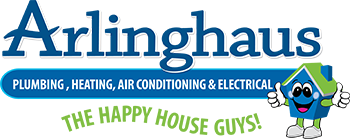As we brace for another hot summer, you want to make sure that your air conditioner is ready to keep your house cool without missing a beat. If you spot some trouble when you first turn it on this spring, you may not know what is causing it. Each of these common air conditioning problems have unique causes that could affect your cooling efficiency or even the system’s ability to function at all. Fortunately, regular maintenance and scheduled service can often keep them under control for another year.
Problem: Air Conditioner Will Not Turn On
Likely Culprit: Electrical Problems
Your air conditioner needs electrical power in order to work, and access to that power can be affected in a couple of different ways. If your air conditioner does not seem to be doing anything at all, check the circuit breaker and confirm that it is switched on. If it is on and the appliance is connected to power, try turning down the thermostat a couple of degrees to see if that gets the system going properly. If not, you may have electrical problems with the compressor or fan. When you are having other issues with the air conditioner, they may be forcing the unit to cycle on and off more frequently than normal. This process could wear out the compressor or fan prematurely.
To prevent this from happening, make sure that you schedule professional air conditioner maintenance every year to keep an eye on the condition of these parts.
Problem: System Does Not Blow Cool Air
Likely Culprit: Low Refrigerant
If you turn on the air conditioning and all it does is blow room temperature air, you could have a problem with refrigerant. The refrigerant in the air conditioning unit is designed to remove heat from the air so the blower can send the remaining cool air back to the home. If the refrigerant level is low due to leakage or another concern, it needs a fix and a refill to work properly.
This task requires a professional who can fix a leak or confirm that there is no problem before you add more refrigerant. Otherwise, the refrigerant will continue to leak out of the gap, continuing your cooling problems and posing risks to the environment.
Problem: Too-Frequent Cycling
Likely Culprit: Clogged Air Filters
A well-tuned air conditioning system will cycle on and off around 3-6 times per hour. This is not an excessive amount. However, the length of each cycle depends on the health of the system. If the air conditioner seems to be turning on and then quickly shutting off before the desired temperature has been achieved, this is not representative of normal function for the air conditioner.
Clogged air filters cause this problem because the air conditioner must push harder to get the air through the filter. This causes the air conditioner to overheat and shut off. If the filters are not cleaned regularly, the dirt and debris will spread to other parts of the machine and create other issues.
Problem: Inadequate Cooling
Likely Culprit: Dirty Evaporator Coils
If your air filters aren’t being cleaned or replaced frequently enough, you can end up with dirty evaporator coils.
The evaporator coils use refrigerant to take heat and humidity from the air, to be cycled outside while the air is circulated back through the home. When the evaporator coils start to accumulate dirt and dust, they collect condensation from the cooling process. The refrigerant freezes the water and forces the system to run longer to melt the ice. This starts a cycle of freezing, melting, overheating and refreezing that can slow your cooling efficiency or force your air conditioner to shut off entirely. Regular replacement of air filters and professional service at least once a year can keep your evaporator coils clean and working well.
Problem: Outdoor Unit Leaking Water
Likely Culprit: Blocked Condensate Drain
In an air conditioning system that is working properly, heat and humidity are taken to the condensing coils in the exterior unit. The condenser cools the refrigerant again so that it can be cycled back inside to the evaporator coils. As you can tell, this cycle can generate a fair amount of condensation. That water must be removed from the air conditioner, so it does not back up and damage the electrical components of the machine. In each air conditioning unit is a condensate drain line, a small tube that releases the water a safe distance away from the appliance. If this tube gets blocked with dirt, grass, leaves or ice, the air conditioner will start to collect water. When the problem is left to build for too long, the system may shut down to protect itself.
Air conditioning problems are not something you want to deal with at the start of the hot season. By looking at these common cooling obstacles and their causes, you can arrange to get them fixed in time.


